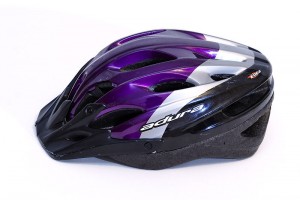Statistics indicate that traumatic brain injury, or TBI, is the foremost cause of death in persons under the age of 45. The majority of these events occur as the result of motor vehicle accidents, with falls and sports related situations following close behind. Studies show that annually, well over one million Americans suffer an injury that results in TBI and 50,000 of those people die.
Continuing Controversy over Bike Helmet Laws
Twenty states, including the District of Columbia require all individuals to wear an approved helmet while operating or riding on a motorcycle. Nineteen states require minors under the age of 18 to wear a helmet whether as the operator or as a passenger of a motorcycle. These laws vary from state to state with regard to mandatory helmets and the operation of low-powered scooters and bicycles. However, states having the most stringent helmet laws also have stipulations for these categories.
Many attest to lives saved while wearing a helmet. States and countries requiring mandatory helmets provide statistics indicating that fatalities have decreased in some instances by greater than one-half. However, those against helmets suggest flawed results and argue the fatalities have decreased because the laws cause fewer riders and subsequently fewer accidents.
Anti-helmet proponents cite that while helmets do provide a certain degree of protection, studies also indicate a helmet under many circumstances increases the risk for serious injury. While a helmet protects the skull from blunt force trauma, they do not protect the brain from collision within the skull. Tests also indicate during impact, the additional weight of a helmet contributes to g-forces on the neck and spine, resulting in tearing and shearing injuries. These riders argue that the reduction in head injuries on motorcycles is not from helmet use, but from reduced ridership by individuals who do not wish to wear helmets.
Bicyclists Need Helmets, Despite Lower Speeds
Laws concerning bicycle helmets are much less controversial. There is a broad consensus showing that helmets do indeed save lives. But the difference lies in the speeds traveled by bicycles versus motorcycles. While a bicycle might gain a speed of 30 mph, motorcycles can go much faster, multiplying the level of force from a collision and subsequently the severity of head injuries when they occur.
Even though bicycle helmets are recommended by pediatricians for all children, not all states have helmet laws, even when it concerns bicycles and children. According to the Insurance Institute for Highway Safety, using a helmet while riding a bicycle reduces the risk of head injury by 85 percent. Even adults should wear helmets because 86 percent of bicycle deaths involve riders age 16 and older.
Contact Us
Individuals or loved ones who have suffered the effects of traumatic brain injury are advised to seek legal counsel by contacting our office. Our trained and qualified attorneys will evaluate your case to determine the rights and options available to you for compensation. Those enduring the pain, suffering and financial burdens of traumatic events may be entitled to monetary awards.




There are several perported statements for the reason for the reduced amount of head injuries by motorcycle riders. However the fact that more riders are schooled on the basics of riding a motorcycle have helped in reducing the amount of accidents. Therefore less accidents less head injuries and deaths. Also there is education courses for the other vehicle operators MSAP (MOTORCYCLE SAFETY AWARENESS PROGRAM), this program teaches vehicle operators how to be aware of the motorcycle traffic on the highways. Currently in North Carolina classes are taught to student drivers taking Driver’s Education Classes. Also, I know MSAP is one of the most effective things to contribute to lower accident and fatality rates nationwide. Educating the motoring public to be aware of motorcycle operators using the highways. Helmets should be optional for the adult for the simple reason that it considered as PERSON Protective Equipment.
Good afternoon;
I read where the BILC was at one time providing bicycle helmets for public outreach and distribution. I am writing to find out if the program still exists and how we would be able to obtain some if the program exists.
Thank you
VR
D